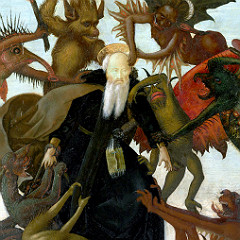
Things today seem more fragmented than ever. Try focusing on your job, for instance, amid the alerts for incoming email, social media updates, and meeting invites. Add to that phone calls, interrupting coworkers, and elastic tasks stretching past allotted times and squeezing into others. Nice knowing you, margin. And that’s just what outsiders impose.
Inside the mind there are — at least for me — forty-two stray thoughts trying to push to the fore, some succeeding and distracting me while I try to chase them down before returning to the job at hand. Oy vey. But maybe things are really not more fragmented today. Maybe people have always struggled with distraction and finding singleness of mind.
What the monk learned
After retreating to the desert, one of the very first monastics, Anthony the Great, fell into a spiritual “weariness and confusion of thought,” as it says in The Sayings of the Fathers. The frustrated Anthony could not abide this and turned to God for help. “Lord,” he prayed, “I would be made whole and my thoughts will not suffer me. What shall I do in this tribulation, how shall I be whole?”
The answer in the third century is the same for us in the twenty-first. God sent an angel to model something for Anthony. He imagined seeing a man that looked like him working. As the man worked, he suddenly stopped, stood, and prayed. Then he sat back down to work, rising again after a time to pray. And so on. “This do,” said the angel, “and thou shalt be whole.” Anthony did and “found the deliverance he sought” (7.1).
When our thoughts are fragmented, it’s difficult to find meaning in them beyond the instant. There is no way to contemplate the whole because there is no whole, merely a jumble of particulars. Light comes in sharp flashes rather than a steady glow. As Anthony found, this state can be spiritually taxing. The heart longs for meaning, for an end to which all the particulars point. It is only when the particulars resolve into a larger pattern that the soul can rest.
What the angel revealed to Anthony is that prayer becomes the end, prayer becomes the point. We give the endless tasks and distractions meaning when we pause for thanksgiving, when we turn to reflect on God’s grace, when we plead for his mercy. Prayer takes up the shards, and God exchanges them for an unbroken whole.
The necessity of patience
The text doesn’t say how quickly this worked for Anthony. He was a spiritual master. I’m nothing of the sort. So it should come as no surprise that I still struggle with this. Still, I would wager that he did as well. No matter the practitioner, prayer is a discipline that requires patience.
When Isaac prayed for his barren wife, Genesis says that God answered his prayer. It also says that Rebekah gave birth twenty years later. Patience is similarly a prerequisite for spiritual growth. If we don’t cultivate patience, we might as well give up the rest too.
The Sayings of the Fathers offers us a picture of this as well. A young monk went to an elder and said he was troubled and could find no peace. The old monk gave him advice, which proved futile — and then more advice which similarly proved futile. Wait a minute, said the elder. How long have you been suffering? Eight years, came the answer. That’s nothing, the elder responded. “I have been in this habit seventy years, and not for one day could I find peace: and you would have peace in eight?” (7.5) We can excuse the exaggeration and appreciate the sentiment. The point is not that peace is impossible; rather that it’s not instantaneous. The young monk was coming at the problem from the wrong angle.
Me too, most of the time.
Prayer gives us a path to walk as much as a point to seek. It shapes our hearts as we work toward peace, and that shaping is an essential part of the process. There are no corners to cut here, though we want to do so when the phone chirps or the laptop dings. Let them be for the moment, and offer the hour to the Lord, who is the only one able to make sense for us of every hour.
What would happen today if you could step away from the crises and chaos several times and refer it all to the Lord?
Side note: Aids to prayer
Prayer is simple. And like a lot of simple things, it can be extremely challenging. Thankfully, the church offers many aids to prayer. Here are three:
First, a prayer book. Liturgical churches often employ service books for private and corporate worship. I use a few different Orthodox prayer books. They offer morning and evening prayer services, along with prayers for different occasions. The benefit is that they train my prayer life and provide the words I most need to say — that’s particularly helpful when I don’t have words of my own or feel spiritually at a loss.
Second, the Psalms. The Psalter is the first prayer book, and it’s words refer every human emotion, doubt, and question to their maker. When we read them Christologically, we are reminded that Christ experienced these emotions and exigencies just like us — and that he prays with us in and through the Psalms.
Third, a prayer rope or beads. I use a small fifty-knot prayer rope. It gives me a physical reminder to pray. Whenever I reach into my pocket, it’s a tactile trigger to pray. I sometimes wear it around my wrist for the same reason.
















